Professional Development Report: Learning Theories at Hilton Hotel
VerifiedAdded on 2021/02/19
|9
|2017
|41
Report
AI Summary
This report provides a comprehensive analysis of professional development within the context of the Hilton Hotel. It begins with an introduction to professional identity and its significance in the hospitality industry, followed by an examination of the key benefits of ongoing professional development for various stakeholders, including employees and employers. The report investigates employer expectations regarding skills and competencies for different job roles, such as managers and waiters, and assesses the importance of these skills in achieving organizational goals. The report then evaluates the author's own abilities, skills, and competencies, identifying strengths and weaknesses through SWOT analysis. It also reviews a range of learning theories and approaches, such as social learning theory and behaviorist approaches, used for personal and professional development processes. The report concludes by emphasizing the importance of continuous development for employees and employers, with references to relevant books and journals.
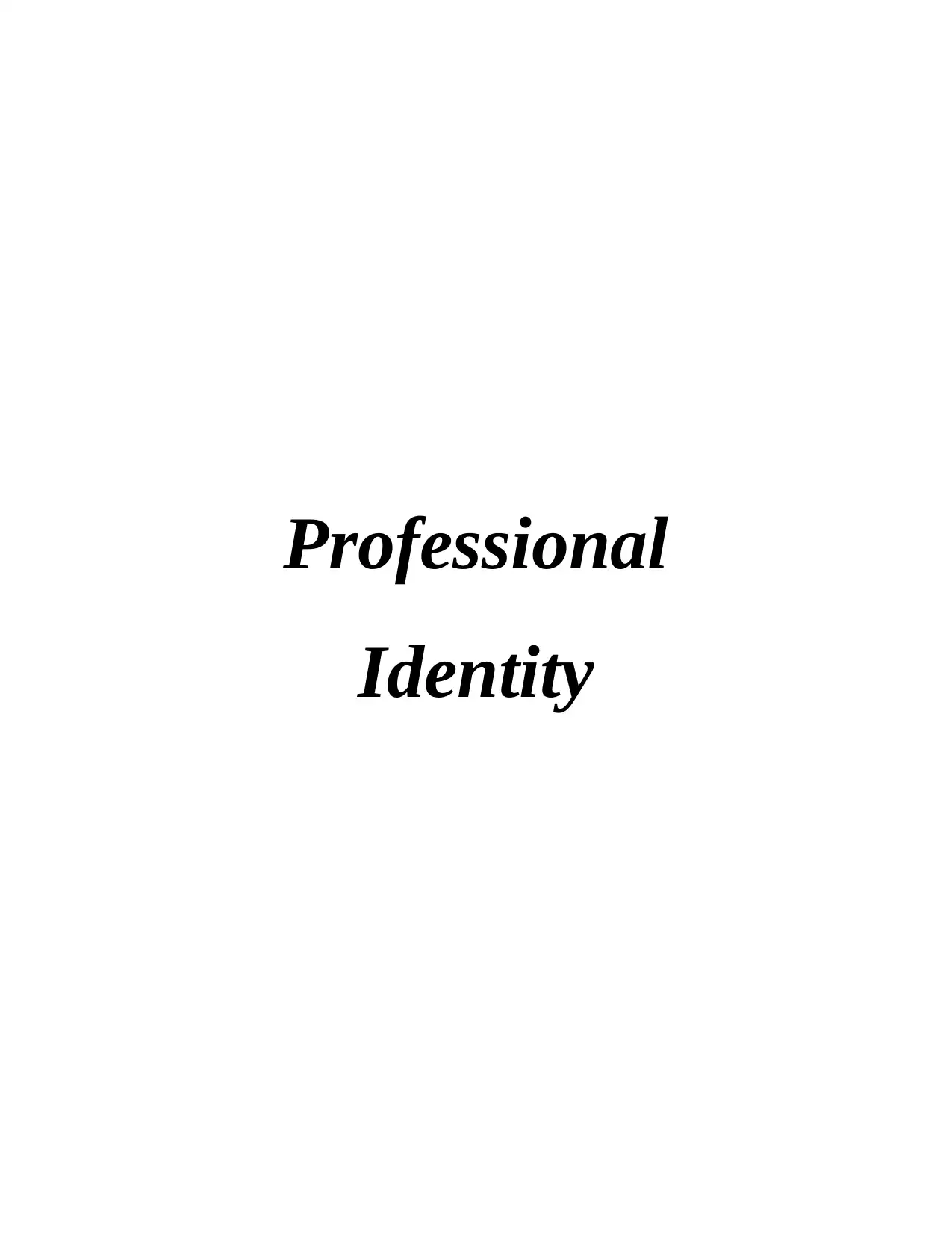
Professional
Identity
Identity
Paraphrase This Document
Need a fresh take? Get an instant paraphrase of this document with our AI Paraphraser
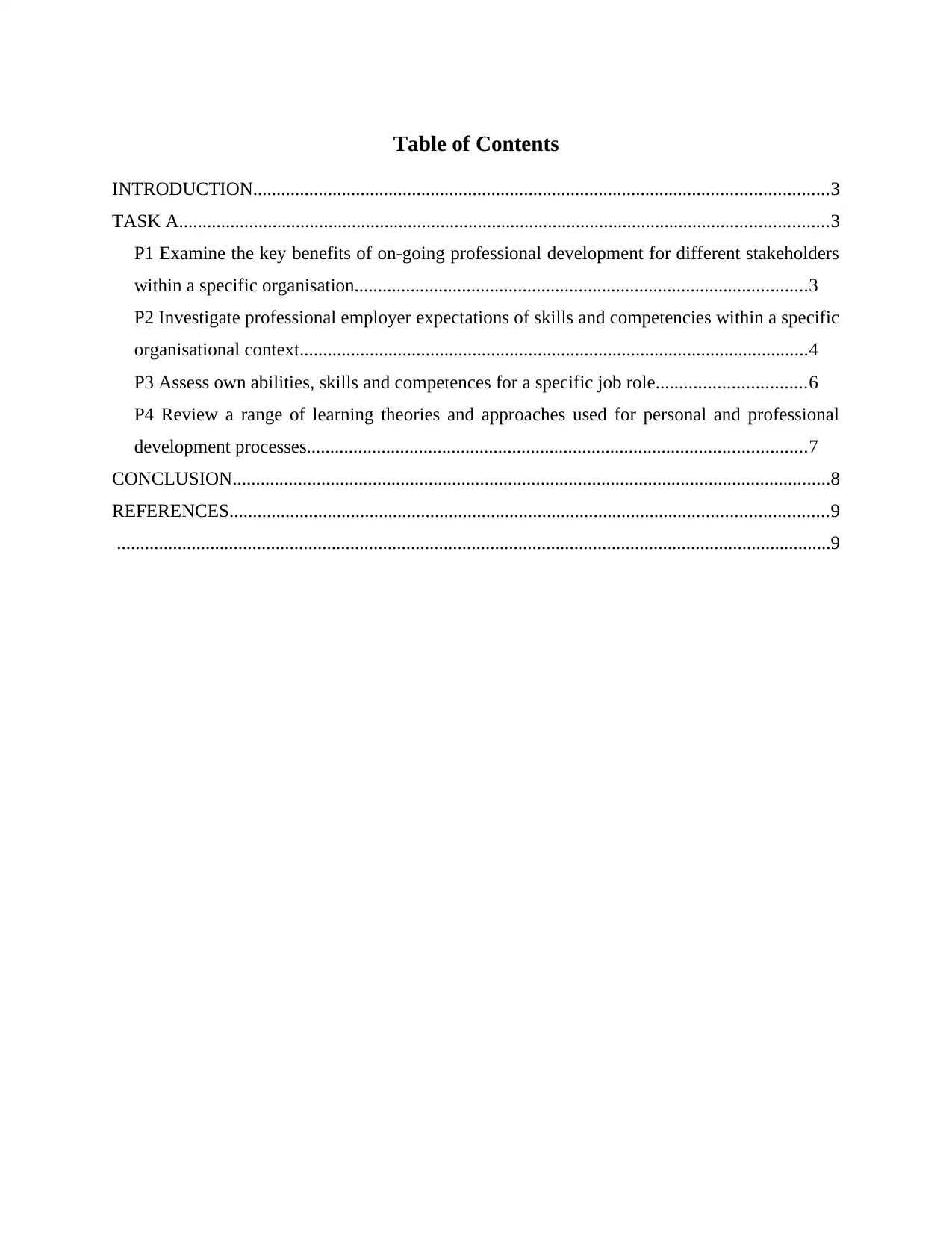
Table of Contents
INTRODUCTION...........................................................................................................................3
TASK A...........................................................................................................................................3
P1 Examine the key benefits of on-going professional development for different stakeholders
within a specific organisation.................................................................................................3
P2 Investigate professional employer expectations of skills and competencies within a specific
organisational context.............................................................................................................4
P3 Assess own abilities, skills and competences for a specific job role................................6
P4 Review a range of learning theories and approaches used for personal and professional
development processes...........................................................................................................7
CONCLUSION................................................................................................................................8
REFERENCES................................................................................................................................9
.........................................................................................................................................................9
INTRODUCTION...........................................................................................................................3
TASK A...........................................................................................................................................3
P1 Examine the key benefits of on-going professional development for different stakeholders
within a specific organisation.................................................................................................3
P2 Investigate professional employer expectations of skills and competencies within a specific
organisational context.............................................................................................................4
P3 Assess own abilities, skills and competences for a specific job role................................6
P4 Review a range of learning theories and approaches used for personal and professional
development processes...........................................................................................................7
CONCLUSION................................................................................................................................8
REFERENCES................................................................................................................................9
.........................................................................................................................................................9
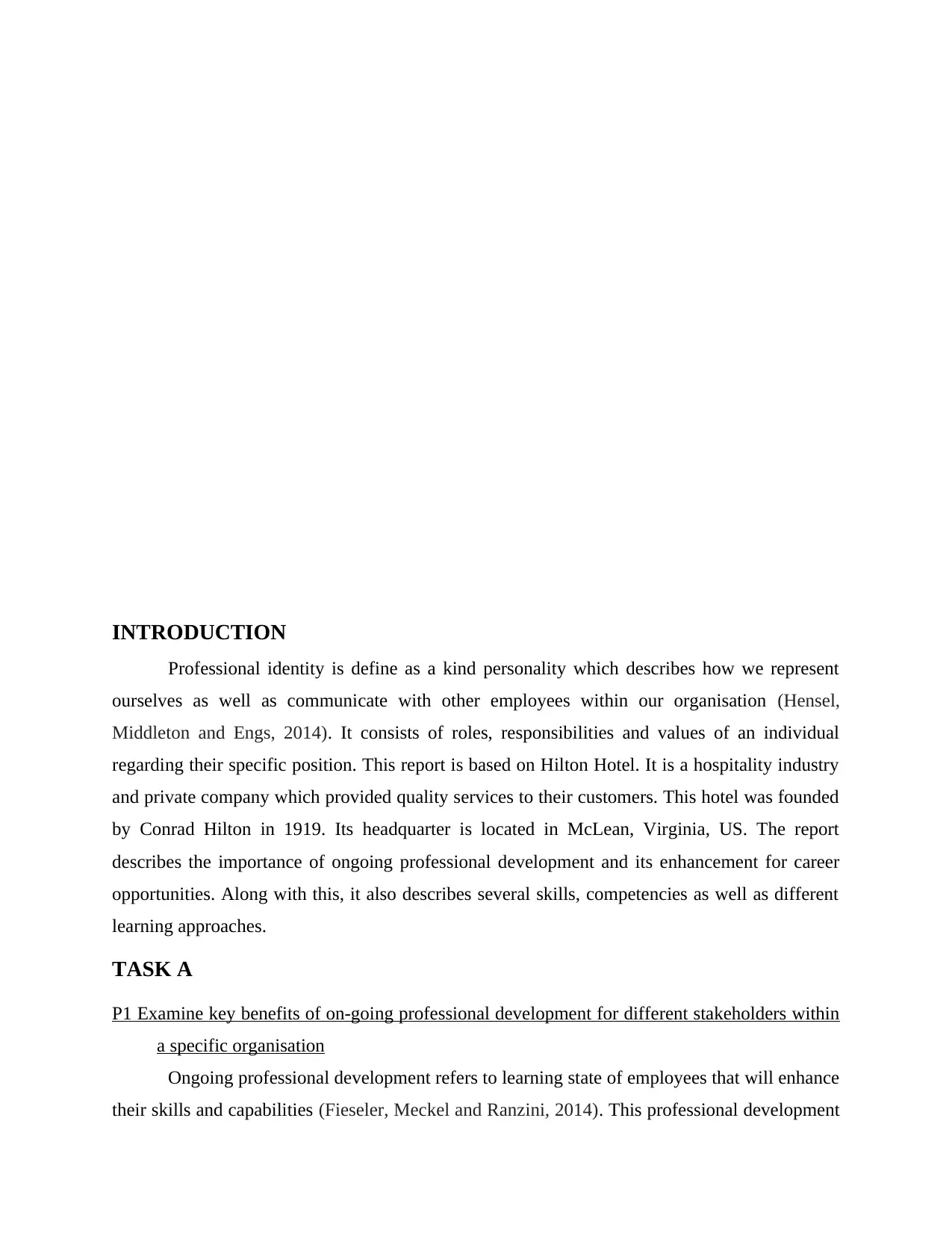
INTRODUCTION
Professional identity is define as a kind personality which describes how we represent
ourselves as well as communicate with other employees within our organisation (Hensel,
Middleton and Engs, 2014). It consists of roles, responsibilities and values of an individual
regarding their specific position. This report is based on Hilton Hotel. It is a hospitality industry
and private company which provided quality services to their customers. This hotel was founded
by Conrad Hilton in 1919. Its headquarter is located in McLean, Virginia, US. The report
describes the importance of ongoing professional development and its enhancement for career
opportunities. Along with this, it also describes several skills, competencies as well as different
learning approaches.
TASK A
P1 Examine key benefits of on-going professional development for different stakeholders within
a specific organisation
Ongoing professional development refers to learning state of employees that will enhance
their skills and capabilities (Fieseler, Meckel and Ranzini, 2014). This professional development
Professional identity is define as a kind personality which describes how we represent
ourselves as well as communicate with other employees within our organisation (Hensel,
Middleton and Engs, 2014). It consists of roles, responsibilities and values of an individual
regarding their specific position. This report is based on Hilton Hotel. It is a hospitality industry
and private company which provided quality services to their customers. This hotel was founded
by Conrad Hilton in 1919. Its headquarter is located in McLean, Virginia, US. The report
describes the importance of ongoing professional development and its enhancement for career
opportunities. Along with this, it also describes several skills, competencies as well as different
learning approaches.
TASK A
P1 Examine key benefits of on-going professional development for different stakeholders within
a specific organisation
Ongoing professional development refers to learning state of employees that will enhance
their skills and capabilities (Fieseler, Meckel and Ranzini, 2014). This professional development
⊘ This is a preview!⊘
Do you want full access?
Subscribe today to unlock all pages.

Trusted by 1+ million students worldwide
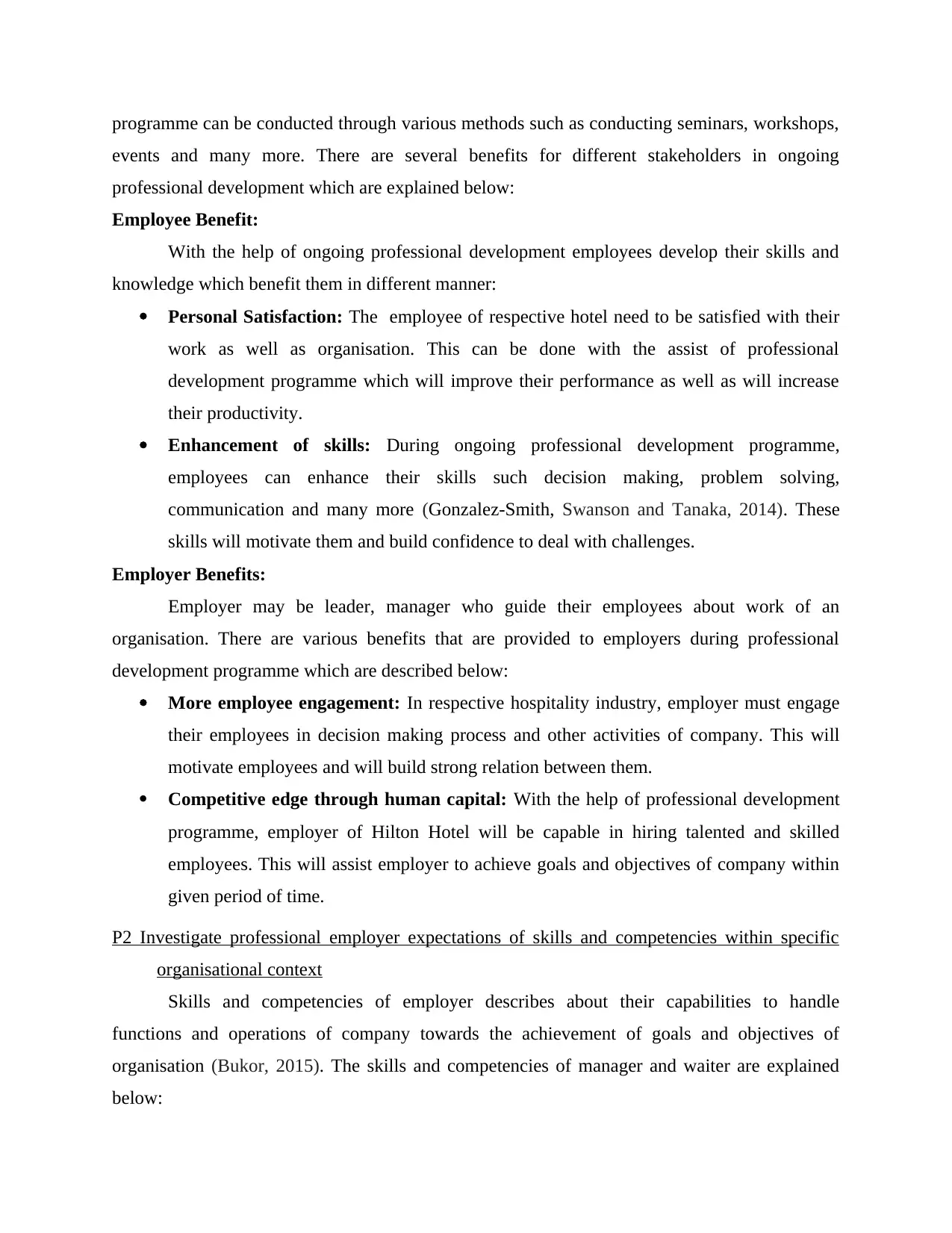
programme can be conducted through various methods such as conducting seminars, workshops,
events and many more. There are several benefits for different stakeholders in ongoing
professional development which are explained below:
Employee Benefit:
With the help of ongoing professional development employees develop their skills and
knowledge which benefit them in different manner:
Personal Satisfaction: The employee of respective hotel need to be satisfied with their
work as well as organisation. This can be done with the assist of professional
development programme which will improve their performance as well as will increase
their productivity.
Enhancement of skills: During ongoing professional development programme,
employees can enhance their skills such decision making, problem solving,
communication and many more (Gonzalez-Smith, Swanson and Tanaka, 2014). These
skills will motivate them and build confidence to deal with challenges.
Employer Benefits:
Employer may be leader, manager who guide their employees about work of an
organisation. There are various benefits that are provided to employers during professional
development programme which are described below:
More employee engagement: In respective hospitality industry, employer must engage
their employees in decision making process and other activities of company. This will
motivate employees and will build strong relation between them.
Competitive edge through human capital: With the help of professional development
programme, employer of Hilton Hotel will be capable in hiring talented and skilled
employees. This will assist employer to achieve goals and objectives of company within
given period of time.
P2 Investigate professional employer expectations of skills and competencies within specific
organisational context
Skills and competencies of employer describes about their capabilities to handle
functions and operations of company towards the achievement of goals and objectives of
organisation (Bukor, 2015). The skills and competencies of manager and waiter are explained
below:
events and many more. There are several benefits for different stakeholders in ongoing
professional development which are explained below:
Employee Benefit:
With the help of ongoing professional development employees develop their skills and
knowledge which benefit them in different manner:
Personal Satisfaction: The employee of respective hotel need to be satisfied with their
work as well as organisation. This can be done with the assist of professional
development programme which will improve their performance as well as will increase
their productivity.
Enhancement of skills: During ongoing professional development programme,
employees can enhance their skills such decision making, problem solving,
communication and many more (Gonzalez-Smith, Swanson and Tanaka, 2014). These
skills will motivate them and build confidence to deal with challenges.
Employer Benefits:
Employer may be leader, manager who guide their employees about work of an
organisation. There are various benefits that are provided to employers during professional
development programme which are described below:
More employee engagement: In respective hospitality industry, employer must engage
their employees in decision making process and other activities of company. This will
motivate employees and will build strong relation between them.
Competitive edge through human capital: With the help of professional development
programme, employer of Hilton Hotel will be capable in hiring talented and skilled
employees. This will assist employer to achieve goals and objectives of company within
given period of time.
P2 Investigate professional employer expectations of skills and competencies within specific
organisational context
Skills and competencies of employer describes about their capabilities to handle
functions and operations of company towards the achievement of goals and objectives of
organisation (Bukor, 2015). The skills and competencies of manager and waiter are explained
below:
Paraphrase This Document
Need a fresh take? Get an instant paraphrase of this document with our AI Paraphraser
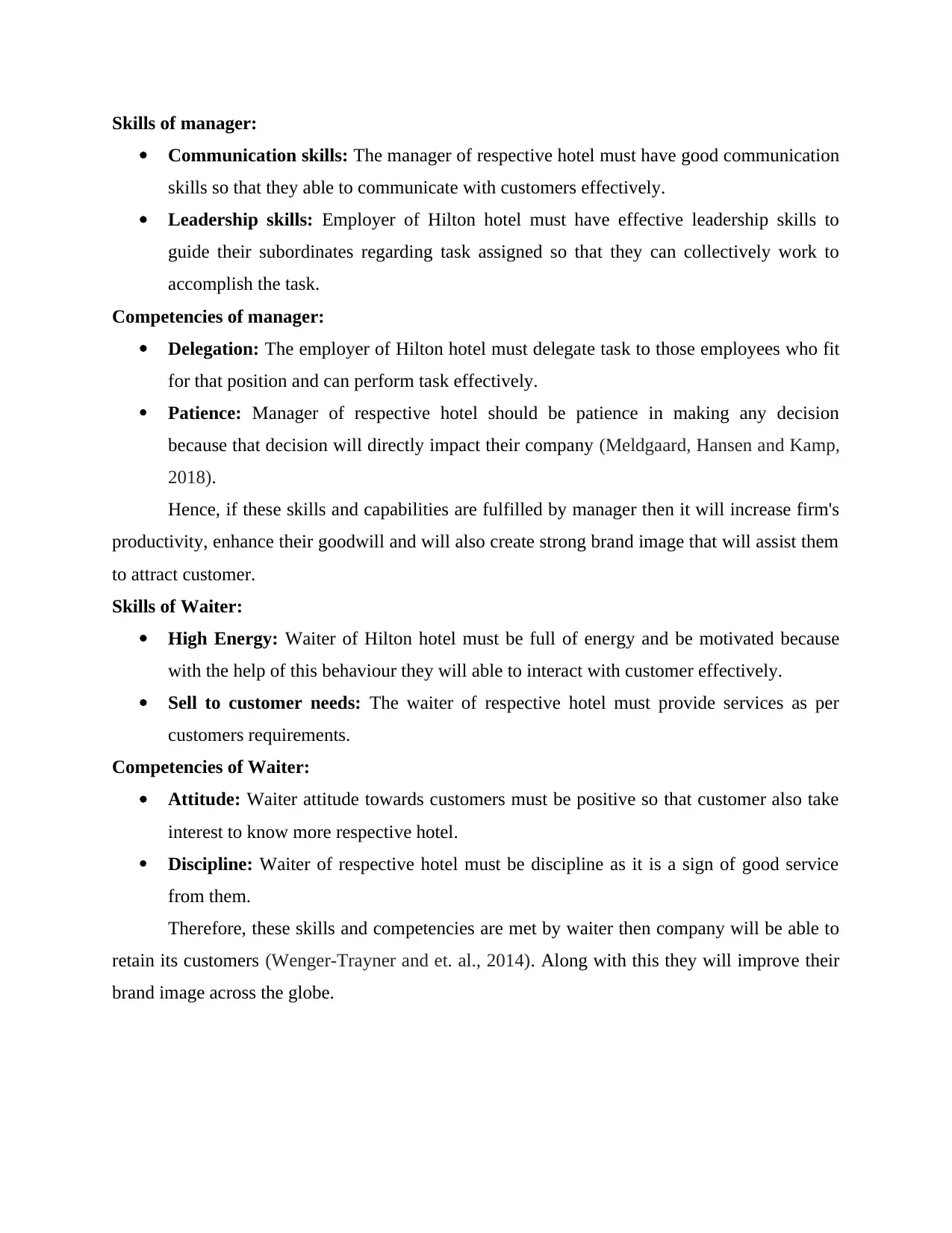
Skills of manager:
Communication skills: The manager of respective hotel must have good communication
skills so that they able to communicate with customers effectively.
Leadership skills: Employer of Hilton hotel must have effective leadership skills to
guide their subordinates regarding task assigned so that they can collectively work to
accomplish the task.
Competencies of manager:
Delegation: The employer of Hilton hotel must delegate task to those employees who fit
for that position and can perform task effectively.
Patience: Manager of respective hotel should be patience in making any decision
because that decision will directly impact their company (Meldgaard, Hansen and Kamp,
2018).
Hence, if these skills and capabilities are fulfilled by manager then it will increase firm's
productivity, enhance their goodwill and will also create strong brand image that will assist them
to attract customer.
Skills of Waiter:
High Energy: Waiter of Hilton hotel must be full of energy and be motivated because
with the help of this behaviour they will able to interact with customer effectively.
Sell to customer needs: The waiter of respective hotel must provide services as per
customers requirements.
Competencies of Waiter:
Attitude: Waiter attitude towards customers must be positive so that customer also take
interest to know more respective hotel.
Discipline: Waiter of respective hotel must be discipline as it is a sign of good service
from them.
Therefore, these skills and competencies are met by waiter then company will be able to
retain its customers (Wenger-Trayner and et. al., 2014). Along with this they will improve their
brand image across the globe.
Communication skills: The manager of respective hotel must have good communication
skills so that they able to communicate with customers effectively.
Leadership skills: Employer of Hilton hotel must have effective leadership skills to
guide their subordinates regarding task assigned so that they can collectively work to
accomplish the task.
Competencies of manager:
Delegation: The employer of Hilton hotel must delegate task to those employees who fit
for that position and can perform task effectively.
Patience: Manager of respective hotel should be patience in making any decision
because that decision will directly impact their company (Meldgaard, Hansen and Kamp,
2018).
Hence, if these skills and capabilities are fulfilled by manager then it will increase firm's
productivity, enhance their goodwill and will also create strong brand image that will assist them
to attract customer.
Skills of Waiter:
High Energy: Waiter of Hilton hotel must be full of energy and be motivated because
with the help of this behaviour they will able to interact with customer effectively.
Sell to customer needs: The waiter of respective hotel must provide services as per
customers requirements.
Competencies of Waiter:
Attitude: Waiter attitude towards customers must be positive so that customer also take
interest to know more respective hotel.
Discipline: Waiter of respective hotel must be discipline as it is a sign of good service
from them.
Therefore, these skills and competencies are met by waiter then company will be able to
retain its customers (Wenger-Trayner and et. al., 2014). Along with this they will improve their
brand image across the globe.
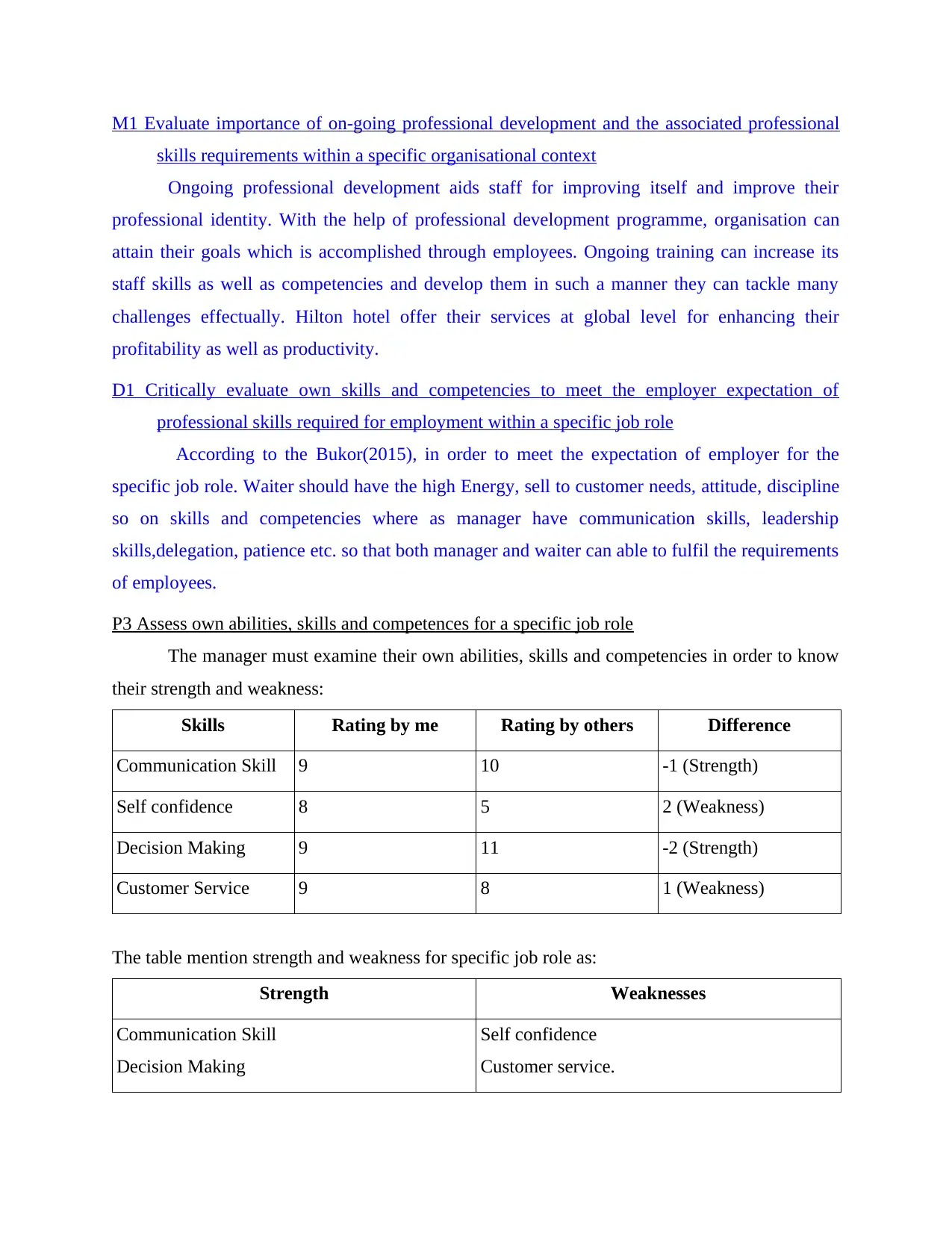
M1 Evaluate importance of on-going professional development and the associated professional
skills requirements within a specific organisational context
Ongoing professional development aids staff for improving itself and improve their
professional identity. With the help of professional development programme, organisation can
attain their goals which is accomplished through employees. Ongoing training can increase its
staff skills as well as competencies and develop them in such a manner they can tackle many
challenges effectually. Hilton hotel offer their services at global level for enhancing their
profitability as well as productivity.
D1 Critically evaluate own skills and competencies to meet the employer expectation of
professional skills required for employment within a specific job role
According to the Bukor(2015), in order to meet the expectation of employer for the
specific job role. Waiter should have the high Energy, sell to customer needs, attitude, discipline
so on skills and competencies where as manager have communication skills, leadership
skills,delegation, patience etc. so that both manager and waiter can able to fulfil the requirements
of employees.
P3 Assess own abilities, skills and competences for a specific job role
The manager must examine their own abilities, skills and competencies in order to know
their strength and weakness:
Skills Rating by me Rating by others Difference
Communication Skill 9 10 -1 (Strength)
Self confidence 8 5 2 (Weakness)
Decision Making 9 11 -2 (Strength)
Customer Service 9 8 1 (Weakness)
The table mention strength and weakness for specific job role as:
Strength Weaknesses
Communication Skill
Decision Making
Self confidence
Customer service.
skills requirements within a specific organisational context
Ongoing professional development aids staff for improving itself and improve their
professional identity. With the help of professional development programme, organisation can
attain their goals which is accomplished through employees. Ongoing training can increase its
staff skills as well as competencies and develop them in such a manner they can tackle many
challenges effectually. Hilton hotel offer their services at global level for enhancing their
profitability as well as productivity.
D1 Critically evaluate own skills and competencies to meet the employer expectation of
professional skills required for employment within a specific job role
According to the Bukor(2015), in order to meet the expectation of employer for the
specific job role. Waiter should have the high Energy, sell to customer needs, attitude, discipline
so on skills and competencies where as manager have communication skills, leadership
skills,delegation, patience etc. so that both manager and waiter can able to fulfil the requirements
of employees.
P3 Assess own abilities, skills and competences for a specific job role
The manager must examine their own abilities, skills and competencies in order to know
their strength and weakness:
Skills Rating by me Rating by others Difference
Communication Skill 9 10 -1 (Strength)
Self confidence 8 5 2 (Weakness)
Decision Making 9 11 -2 (Strength)
Customer Service 9 8 1 (Weakness)
The table mention strength and weakness for specific job role as:
Strength Weaknesses
Communication Skill
Decision Making
Self confidence
Customer service.
⊘ This is a preview!⊘
Do you want full access?
Subscribe today to unlock all pages.

Trusted by 1+ million students worldwide
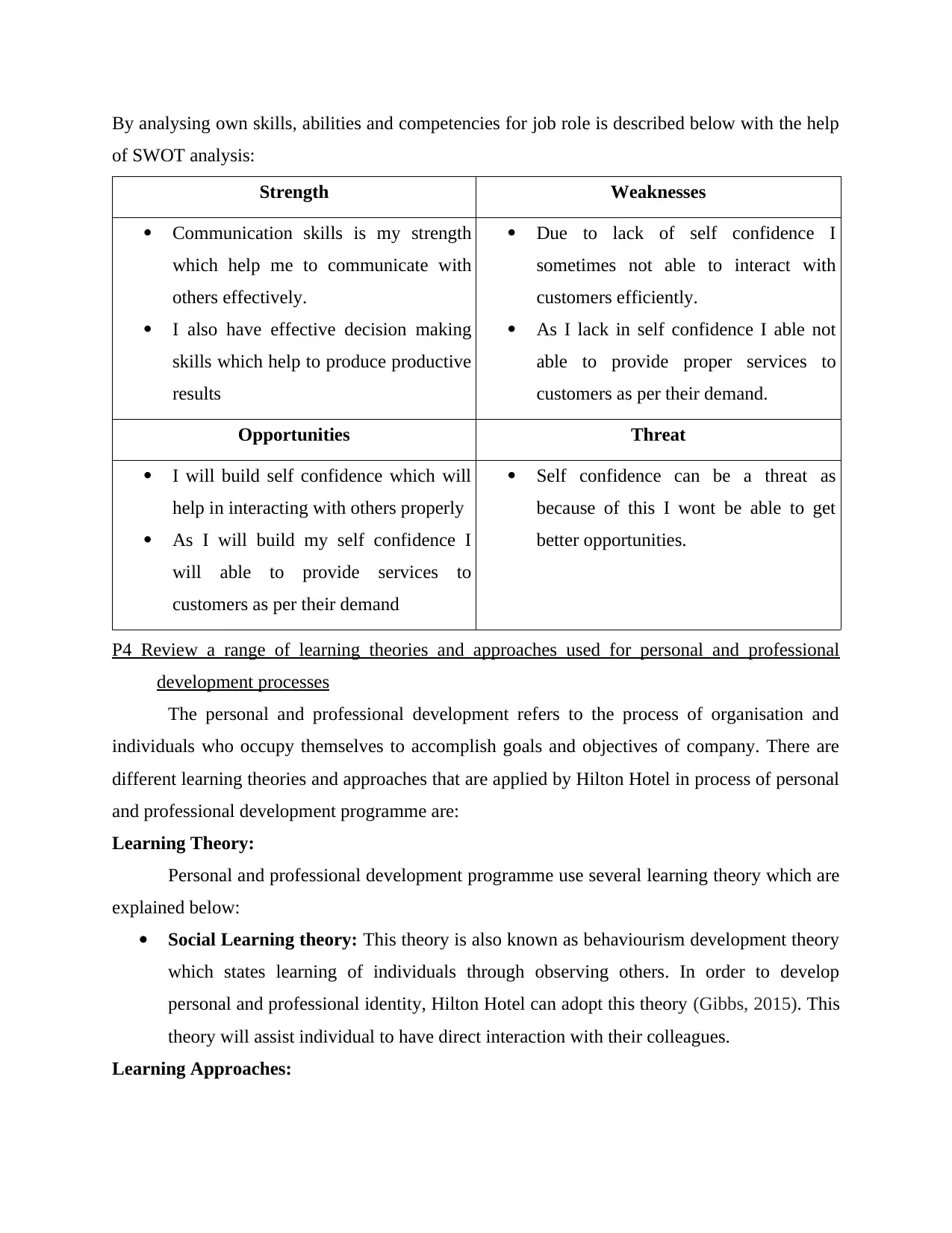
By analysing own skills, abilities and competencies for job role is described below with the help
of SWOT analysis:
Strength Weaknesses
Communication skills is my strength
which help me to communicate with
others effectively.
I also have effective decision making
skills which help to produce productive
results
Due to lack of self confidence I
sometimes not able to interact with
customers efficiently.
As I lack in self confidence I able not
able to provide proper services to
customers as per their demand.
Opportunities Threat
I will build self confidence which will
help in interacting with others properly
As I will build my self confidence I
will able to provide services to
customers as per their demand
Self confidence can be a threat as
because of this I wont be able to get
better opportunities.
P4 Review a range of learning theories and approaches used for personal and professional
development processes
The personal and professional development refers to the process of organisation and
individuals who occupy themselves to accomplish goals and objectives of company. There are
different learning theories and approaches that are applied by Hilton Hotel in process of personal
and professional development programme are:
Learning Theory:
Personal and professional development programme use several learning theory which are
explained below:
Social Learning theory: This theory is also known as behaviourism development theory
which states learning of individuals through observing others. In order to develop
personal and professional identity, Hilton Hotel can adopt this theory (Gibbs, 2015). This
theory will assist individual to have direct interaction with their colleagues.
Learning Approaches:
of SWOT analysis:
Strength Weaknesses
Communication skills is my strength
which help me to communicate with
others effectively.
I also have effective decision making
skills which help to produce productive
results
Due to lack of self confidence I
sometimes not able to interact with
customers efficiently.
As I lack in self confidence I able not
able to provide proper services to
customers as per their demand.
Opportunities Threat
I will build self confidence which will
help in interacting with others properly
As I will build my self confidence I
will able to provide services to
customers as per their demand
Self confidence can be a threat as
because of this I wont be able to get
better opportunities.
P4 Review a range of learning theories and approaches used for personal and professional
development processes
The personal and professional development refers to the process of organisation and
individuals who occupy themselves to accomplish goals and objectives of company. There are
different learning theories and approaches that are applied by Hilton Hotel in process of personal
and professional development programme are:
Learning Theory:
Personal and professional development programme use several learning theory which are
explained below:
Social Learning theory: This theory is also known as behaviourism development theory
which states learning of individuals through observing others. In order to develop
personal and professional identity, Hilton Hotel can adopt this theory (Gibbs, 2015). This
theory will assist individual to have direct interaction with their colleagues.
Learning Approaches:
Paraphrase This Document
Need a fresh take? Get an instant paraphrase of this document with our AI Paraphraser
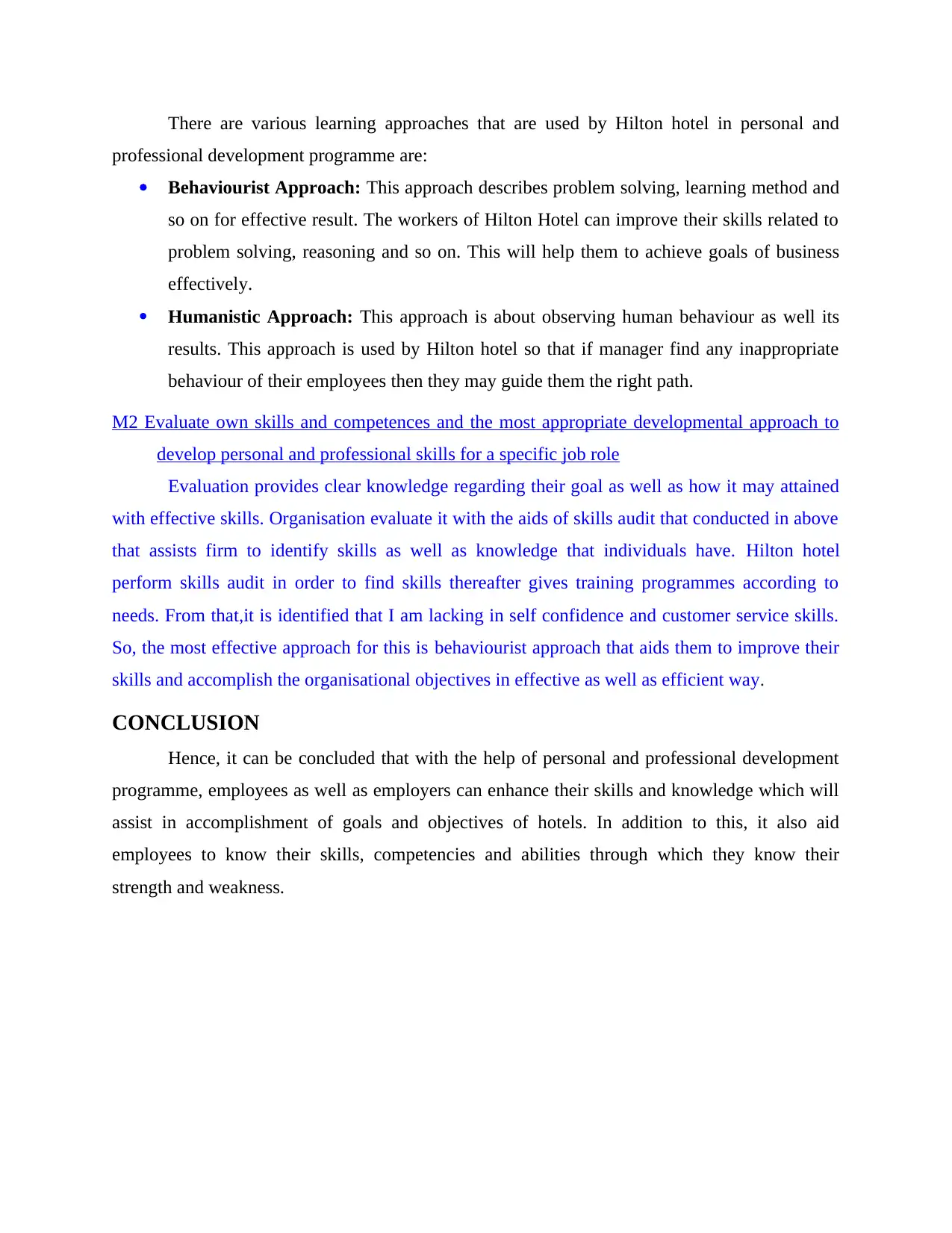
There are various learning approaches that are used by Hilton hotel in personal and
professional development programme are:
Behaviourist Approach: This approach describes problem solving, learning method and
so on for effective result. The workers of Hilton Hotel can improve their skills related to
problem solving, reasoning and so on. This will help them to achieve goals of business
effectively.
Humanistic Approach: This approach is about observing human behaviour as well its
results. This approach is used by Hilton hotel so that if manager find any inappropriate
behaviour of their employees then they may guide them the right path.
M2 Evaluate own skills and competences and the most appropriate developmental approach to
develop personal and professional skills for a specific job role
Evaluation provides clear knowledge regarding their goal as well as how it may attained
with effective skills. Organisation evaluate it with the aids of skills audit that conducted in above
that assists firm to identify skills as well as knowledge that individuals have. Hilton hotel
perform skills audit in order to find skills thereafter gives training programmes according to
needs. From that,it is identified that I am lacking in self confidence and customer service skills.
So, the most effective approach for this is behaviourist approach that aids them to improve their
skills and accomplish the organisational objectives in effective as well as efficient way.
CONCLUSION
Hence, it can be concluded that with the help of personal and professional development
programme, employees as well as employers can enhance their skills and knowledge which will
assist in accomplishment of goals and objectives of hotels. In addition to this, it also aid
employees to know their skills, competencies and abilities through which they know their
strength and weakness.
professional development programme are:
Behaviourist Approach: This approach describes problem solving, learning method and
so on for effective result. The workers of Hilton Hotel can improve their skills related to
problem solving, reasoning and so on. This will help them to achieve goals of business
effectively.
Humanistic Approach: This approach is about observing human behaviour as well its
results. This approach is used by Hilton hotel so that if manager find any inappropriate
behaviour of their employees then they may guide them the right path.
M2 Evaluate own skills and competences and the most appropriate developmental approach to
develop personal and professional skills for a specific job role
Evaluation provides clear knowledge regarding their goal as well as how it may attained
with effective skills. Organisation evaluate it with the aids of skills audit that conducted in above
that assists firm to identify skills as well as knowledge that individuals have. Hilton hotel
perform skills audit in order to find skills thereafter gives training programmes according to
needs. From that,it is identified that I am lacking in self confidence and customer service skills.
So, the most effective approach for this is behaviourist approach that aids them to improve their
skills and accomplish the organisational objectives in effective as well as efficient way.
CONCLUSION
Hence, it can be concluded that with the help of personal and professional development
programme, employees as well as employers can enhance their skills and knowledge which will
assist in accomplishment of goals and objectives of hotels. In addition to this, it also aid
employees to know their skills, competencies and abilities through which they know their
strength and weakness.
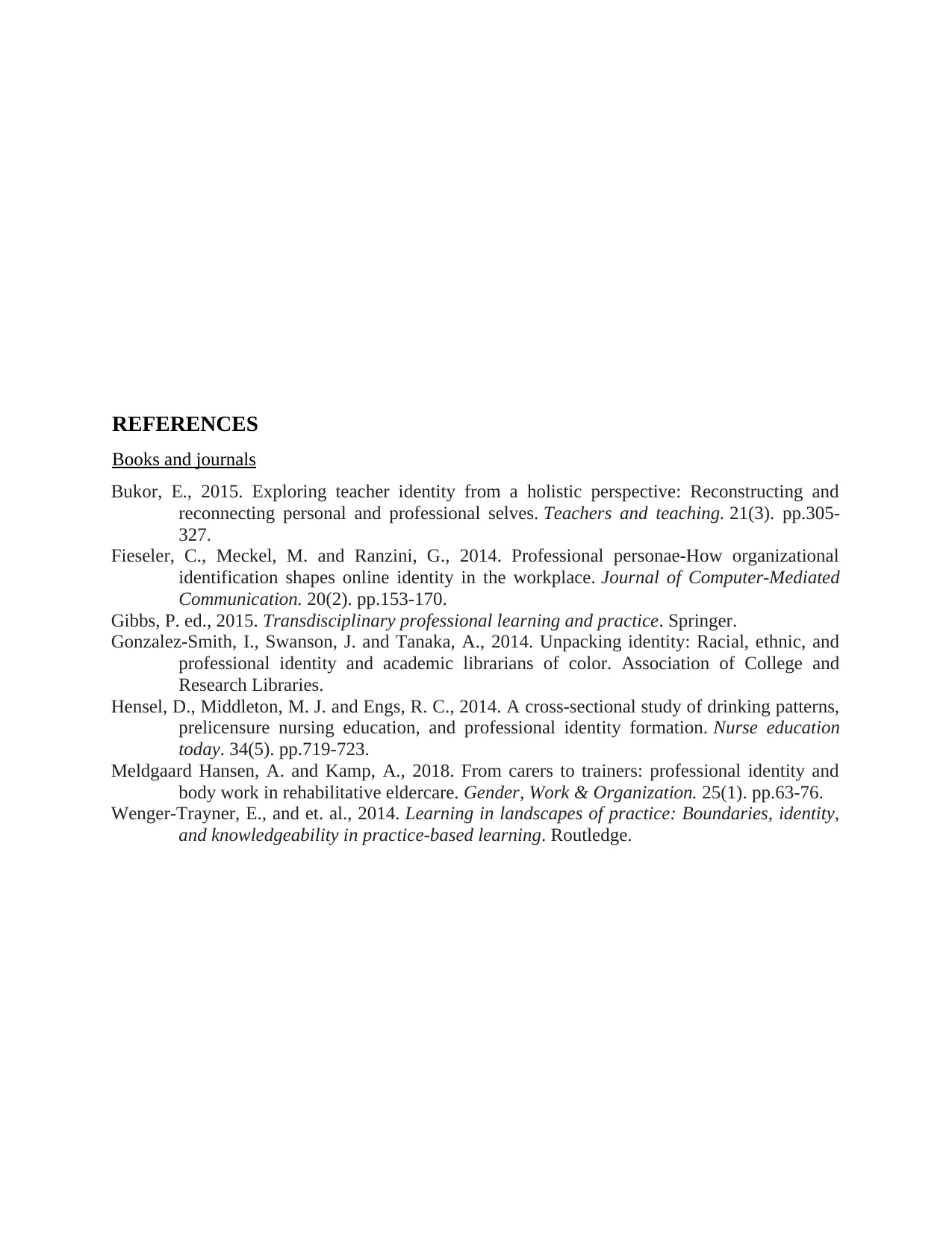
REFERENCES
Books and journals
Bukor, E., 2015. Exploring teacher identity from a holistic perspective: Reconstructing and
reconnecting personal and professional selves. Teachers and teaching. 21(3). pp.305-
327.
Fieseler, C., Meckel, M. and Ranzini, G., 2014. Professional personae-How organizational
identification shapes online identity in the workplace. Journal of Computer-Mediated
Communication. 20(2). pp.153-170.
Gibbs, P. ed., 2015. Transdisciplinary professional learning and practice. Springer.
Gonzalez-Smith, I., Swanson, J. and Tanaka, A., 2014. Unpacking identity: Racial, ethnic, and
professional identity and academic librarians of color. Association of College and
Research Libraries.
Hensel, D., Middleton, M. J. and Engs, R. C., 2014. A cross-sectional study of drinking patterns,
prelicensure nursing education, and professional identity formation. Nurse education
today. 34(5). pp.719-723.
Meldgaard Hansen, A. and Kamp, A., 2018. From carers to trainers: professional identity and
body work in rehabilitative eldercare. Gender, Work & Organization. 25(1). pp.63-76.
Wenger-Trayner, E., and et. al., 2014. Learning in landscapes of practice: Boundaries, identity,
and knowledgeability in practice-based learning. Routledge.
Books and journals
Bukor, E., 2015. Exploring teacher identity from a holistic perspective: Reconstructing and
reconnecting personal and professional selves. Teachers and teaching. 21(3). pp.305-
327.
Fieseler, C., Meckel, M. and Ranzini, G., 2014. Professional personae-How organizational
identification shapes online identity in the workplace. Journal of Computer-Mediated
Communication. 20(2). pp.153-170.
Gibbs, P. ed., 2015. Transdisciplinary professional learning and practice. Springer.
Gonzalez-Smith, I., Swanson, J. and Tanaka, A., 2014. Unpacking identity: Racial, ethnic, and
professional identity and academic librarians of color. Association of College and
Research Libraries.
Hensel, D., Middleton, M. J. and Engs, R. C., 2014. A cross-sectional study of drinking patterns,
prelicensure nursing education, and professional identity formation. Nurse education
today. 34(5). pp.719-723.
Meldgaard Hansen, A. and Kamp, A., 2018. From carers to trainers: professional identity and
body work in rehabilitative eldercare. Gender, Work & Organization. 25(1). pp.63-76.
Wenger-Trayner, E., and et. al., 2014. Learning in landscapes of practice: Boundaries, identity,
and knowledgeability in practice-based learning. Routledge.
⊘ This is a preview!⊘
Do you want full access?
Subscribe today to unlock all pages.

Trusted by 1+ million students worldwide
1 out of 9
Related Documents
Your All-in-One AI-Powered Toolkit for Academic Success.
+13062052269
info@desklib.com
Available 24*7 on WhatsApp / Email
![[object Object]](/_next/static/media/star-bottom.7253800d.svg)
Unlock your academic potential
Copyright © 2020–2026 A2Z Services. All Rights Reserved. Developed and managed by ZUCOL.





